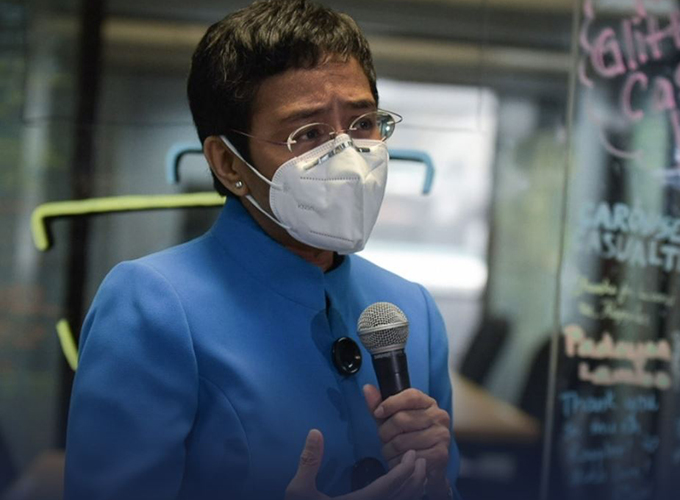
By Lian Buan in Manila
Manila Judge Rainelda Estacio-Montesa has denied the motion for partial reconsideration filed by Rappler journalists, and upheld the cyber libel conviction of Rappler CEO and executive editor Maria Ressa and former researcher-writer Reynaldo Santos Jr.
“In view of the foregoing, the Motion for Partial Reconsideration filed by Accused Reynaldo Santos Jr and Maria Angelita Ressa is denied for lack of merit,” Montesa said in an order signed on Friday.
The next option for Ressa and Santos would be to file an appeal with the Court of Appeals.
READ MORE: Cases vs Maria Ressa, Rappler directors, staff since 2018
In denying the motion of Ressa and Santos, Montesa for the first time cited a Supreme Court First Division ruling from 2018, which says that cyber libel prescribes not 12 years, but 15 years – an even longer period.
The prescription period is one of the most legally contested issues in the Ressa cyber libel case. Former Supreme Court senior associate justice Antonio Carpio maintains that the prescription period is one year.
The disputed Rappler article was published May 2012, which means complainant Wilfredo Keng had the right to sue only until May 2013 if the one year prescription was followed. Keng filed the complaint only in October 2017.
Montesa found an “unpublished resolution of Tolentino v People,” which is a First Division ruling from the Supreme Court dated August 6, 2018.
Judge’s justification
Montesa quoted the resolution to justify her ruling that cyber libel does not prescribe in one year.
Although Montesa previously upheld the Department of Justice (DOJ) theory that cyber libel prescribes in 12 years, she is now citing the Tolentino resolution which says: “Following Article 90 of the Revised Penal Code, the crime of libel in relation to RA 10175 now prescribes in 15 years.”
“Thus, the Court cannot apply the 1-year prescriptive period provided for under the Revised Penal Code as claimed by the defense,” Montesa said.
Montesa’s earlier ruling on prescription period, and Tolentino vs People, have A different legal basis.
Under the Revised Penal Code (RPC), libel prescribes one year. The Cybercrime Law did not explicitly provide a prescription period for cyber libel.
This lack of a textual basis gave DOJ, and later on Montesa, an opening to cite the pre-war Act 3326 which lays down prescriptive periods for special laws.
The Cybercrime Law imposed penalties one degree higher for offenses under it. So from an original penalty of up to 6 years, cyber libel was now imposed a penalty of up to 12 years. Under the archaic Act 3326, that kind of crime prescribes in 12 years, in the DOJ’s and Montesa’s view.
Prescription of crimes
The Tolentino ruling, however, was based on Article 90 of the RPC which lays out prescription of crimes.
The First Division ruling said: “The new penalty (of cyber libel), therefore, becomes afflictive, following Section 25 6of the RPC… following Article 90 7of the RPC, the crime of libel in relation to RA 10175 now prescribes in fifteen (15) years.”
The 2nd paragraph of Article 90 says: “Crimes punishable by other afflictive penalties shall prescribe in fifteen years.”
Article 90
In his earlier column in the Philippine Daily Inquirer, retired justice Carpio pointed out that Article 90 “is classified into two,” and that the 2nd classification still makes cyber libel’s prescription one year.
“Those based on the length or nature of the penalty, and those based on the crime itself regardless of the length or nature of the penalty. Under the first classification are, among others, crimes punishable by correctional penalty which prescribe in 10 years. Under the second classification are, among others, ‘libel and similar offenses’ which prescribe in one year,” Carpio wrote.
Indeed, the 4th and 5th paragraphs of Article 90 said: “The crime of libel or other similar offenses shall prescribe in one year. The crime of oral defamation and slander by deed shall prescribe in six months.”
Cyber libel ‘not new crime’
In declaring the Cybercrime Law constitutional in 2014, the Supreme Court ruled in Disini vs Secretary of Justice that “cyber libel is actually not a new crime” from the RPC libel.
Thus, Carpio noted, “In such a case, the prescriptive period for cyber libel is governed by the RPC which prescribes its own prescriptive periods. Under Article 90 of the RPC, the crime of libel and other similar offenses shall prescribe in one year.”
“The Tolentino citation was unnecessary because, under Disini, there is a specific prescriptive period and that is Art. 90. We will address that on appeal,” said Ressa and Santos’ lawyer, former Supreme Court spokesperson Ted Te.
Ressa faces 5 other criminal cases related to tax, and 3 criminal complaints, including another cyber libel complaint filed by Keng.














































